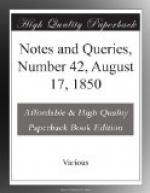S.S.S.
* * * * *
QUERIES.
ESSAYES OF CERTAIN PARADOXES: POEM ON NOTHING.
Who was the author of a thin 4to. volume with the above title, printed for Tho. Thorpe, 1616? The contents are, “The Praise of K. Richard the Third—The French Poetes—Nothing—That it is good to be in Debt.”
The late Mr. Yarnold has a MS. copy of the “Praise of K. Richard,” to which was prefixed the following dedication:—
“TO THE HONOURABLE SIR HENRY NEVILL, KNIGHTE.”
“I am bolde to adventure to your honors viewe this small portion of my privatt labors, as an earnest peny of my love, beinge a mere Paradoxe in prayse of a most blame-worthie and condemned Prince, Kinge Richard the Third; who albeit I shold guilde with farre better termes of eloquence then I have don, and freate myself to deathe in pursuite of his commendations, yet his disgrace beinge so publicke, and the worlde so opinionate of his misdoings, as I shold not be able so farre to justifie him as they to condemne him. Yet that they may see what may be saide, and to shew how farre they haue mispraysed his vertues, this following Treatise shall make manyfest. Your honour may peruse and censure yt at your best leisure, and though yt be not trickt up wth elegance of phrase, yet may it satisfye a right curious judgmente, yf the reasons be considered as they ought. But, howsoever, yf you please to accepte it, I shall thinke my labors well bestowed; who, both in this and what ells may, devote myself to your honour, and rest,
“Your honours most affectionat servant,
“HEN. W.”
The praise of Nothing is very well versified from the Latin of Passerat, whose verses Dr. Johnson thought worthy of a place in his Life of Lord Rochester. Besides Rochester’s seventeen stanzas “Upon Nothing,” there appears to have been another copy of verses on this fertile subject; for Flecknoe, in his Epigrams of All Sorts, 1671, has “Somewhat to Mr. J.A. on his excellent poem of Nothing.” Is anything known of this Nothing?
S.W. SINGER.
Mickleham, July 29. 1850.
* * * * *
MINOR QUERIES.
Papers of Perjury.—In Leicester’s Commonwealth occurs the following passage:—
“The gentlemen were
all taken and cast into prison, and
afterwards were sent down
to Ludlow, there to wear papers of
perjury.”
Can any of your readers refer me to a graphic account of the custom of perjurers wearing papers denoting their crime, to which I suppose this passage alludes?
S.R.
Church Rates.—CH. would be obliged to any of your readers who could refer him to the volume of either the Gentleman’s or the British Magazine which contains some remarks on the article on Church Rates in Knight’s Political Dictionary, and on Cyric-sceat.




